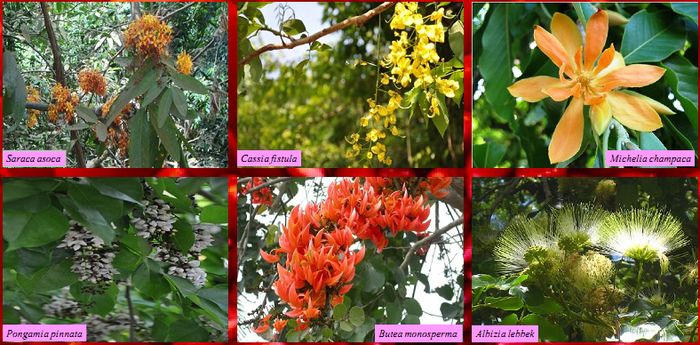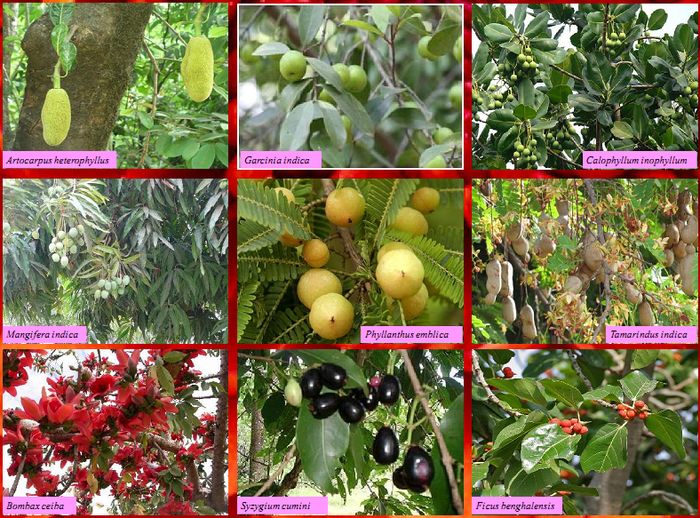 |
Roadside Trees of Uttara Kannada District, Karnataka |
 |
Energy and Wetlands Research Group, Centre for Ecological Sciences [CES], Indian Institute of Science, Bangalore – 560012, India.
*Corresponding author: cestvr@ces.iisc.ac.in
|
ABSTRACT
Road making is associated with destruction of natural areas. Roads criss-crossing through forests
create fragmentation and disturbance to the wildlife. However road-making may be considered a
necessary evil for humans. Roadsides are often neglected places used for dumping of wastes and not
much care given for beautification or planting except in some places. Wherever plantings are done in
the usual manner there is not much regard for ecological conditions or consideration of local
demands. This study is about how best roadsides can be made more eco-friendly through welldesigned
tree planting using appropriate native tree species than exotic ones.
Uttara Kannada district has very varied topography and climate. The district has a coast of sand and
alluvium and rocky areas, a lateritic stretch of low hills and plateaus, the range of Western Ghats and
the eastern portions merging with the Deccan plains. The coastal areas and west-facing portions of
Western Ghats receive rains often more than 3000 mm/yr; the rainfall is down to 1500 mm or less in
the rain-shadow eastern parts.
Considering all these factors we propose in this poster a more useful design for tree planting in the
district, the salient features of which are as follows:
-
Roadsides of sandy or low lying coast will have species like Calophyllum inophyllum,
Pongamia pinnata, Artocarpus heterophyllus and Lagerstroemia flos-reginae.
-
Lateritic terrain roads are good for Sapindus emarginatus, Mangifera indica, Artocarpus
heterophyllus, A. lakoocha, Garcinia indica, Cassia fistula, L. flos-reginae, Michelia
champaca, Mammea suriga, Zanthoxylum rhetsa, Ficus spp., Terminalia bellirica, Caryota
urens etc.
-
Narrow roads passing through forests need not have any additional planting. Wider roads can
be considered for planting according to the rainfall and soils. In heavy rainfall areas, with
non-lateritic soils wild mangoes (Appe-midi varieties), Artocarpus heterophyllus, A.
lakoocha, Corypha umbraculifera (talipot palm), Caryota urens, Mimusops elengi, Strychnos
nux-vomica etc. are good.
-
Roads through eastern low rainfall areas are ideal for Mangifera indica, Tamarindus indicus,
Madhuca indica, Pongamia pinnata, Corypha umbraculifera, Ficus spp., Terminalia
bellirica, Aegle marmelos etc.
INTRODUCTION
-
With the road network continuously increasing at fast rate, roadsides occupy a very broad area in most of the countries.
-
Indian roadsides are often neglected places used for dumping of wastes and not much care given for beautification or planting except in some places.
-
Wherever plantings are done in the usual manner there is not much regard for ecological conditions or consideration of local demands.
-
This study is about how best roadsides can be made more eco-friendly through well-designed tree planting using appropriate native tree species than exotic ones.
IMPORTANCE OF ROADSIDE VEGETATION
MAINTENANCE OF ROADSIDE VEGETATION
FLOWERING TREES FOR ROADSIDE PLANTATIONS

FRUITING TREES FOR ROADSIDE PLANTATIONS

Table 1: List of proposed Tree species based on different locations in Uttara Kannada distric
| DESCRIPTION OF AREAS |
PROPOSED TREE SPECIES FOR PLANTATION |
LOCAL NAME |
UTILITY |
| Roadsides of sandy or low lying coastal areas |
Calophyllum inophyllum |
Honne mara |
Flowering/Fruiting |
| Pongamia pinnata |
Honge mara |
Flowering/Fruiting |
| Artocarpus heterophyllus |
Halsina mara |
Fruiting |
| Lagerstroemia flos-reginae |
Hole dasal |
Flowering/Fruiting |
| Mangifera indica |
Mavina mara |
Flowering/Fruiting |
| Syzygium cumini |
Nerlu |
Flowering/Fruiting |
| Ficus benghalensis |
Aalda mara |
Fruiting |
| Michelia champaca |
Sampige mara |
Flowering |
| Phyllanthus emblica |
Nelli |
Fruiting |
| Tamarindus indicus |
Hunase mara |
Fruiting |
| Lateritic terrain roads |
Sapindus laurifolius |
Antalkai mara |
Fruiting |
| Artocarpus gomezianus |
Wante mara |
Fruiting |
| Garcinia indica |
Murugal mara |
Fruiting |
| Cassia fistula |
Kakkai mara |
Flowering/Fruiting |
| Zanthoxylum rhetsa |
Jummina mara |
Fruiting |
| Terminalia bellerica |
Tare mara |
Fruiting |
| Mammea suriga |
Surige mara |
Flowering/Fruiting |
| Heavy rainfall areas with non-lateritic soils |
Caryota urens |
Barni mara |
Fruiting |
| Mimusops elengi |
Ranjla mara |
Flowering/Fruiting |
| Strychnos nux-vomica |
Kasarkana mara |
Fruiting |
| Vateria indica |
Dhoopa mara |
Flowering/Fruiting |
| Saraca asoca |
Ashoka mara |
Flowering |
| Mesua ferrea |
Nagasampige mara |
Flowering/Fruiting |
| Garcinia gummi-gutta |
Uppage mara |
Fruiting |
| Artocarpus hirsutus |
Hebbalsu mara |
Fruiting |
| Eastern low rainfall areas |
Madhuca indica |
Hippi mara |
Flowering |
| Aegle marmelos |
Bilipatre |
Fruiting |
| Albizzia lebbek |
Shirish |
Flowering |
| Pterocarpus marsupium |
Netra Honne |
Fruiting |
| Diospyros montana |
Balagunike |
Fruiting |
| Anogeissus latifolia |
Dindigalu mara |
Flowering |
| Bombax ceiba |
Buruga mara |
Flowering/Fruiting |
| Alstonia scholaris |
Haale mara |
Flowering |
| Butea monosperma |
Muthuga |
Flowering |
CONCLUSION
In the case of district like Uttara Kannada, the roads are mostly constructed through the forests there by, disturbing the natural vegetation. This paves in way for the entry of exotic species which through their gregarious growth hamper the overall ecology of the region. Hence, it is highly essential to focus on studies dealing with the overall ecology and management of roadside vegetation in order to maintain the cological integrity of the prevailing natural ecosystems.
ACKNOWLEDGEMENT
We wish to thank Mr. G R Rao for his scientific and technical inputs.
|
|
Citation : Vishnu D. Mukri, Sumesh N. Dudani, Subash Chandran M.D. and Ramachandra. T.V, 2012. Roadside Trees of Uttara Kannada District, Karnataka., Proceedings of the LAKE 2012: National Conference on Conservation and Management of Wetland Ecosystems, 06th - 09th November 2012, School of Environmental Sciences, Mahatma Gandhi University, Kottayam, Kerala.
|



